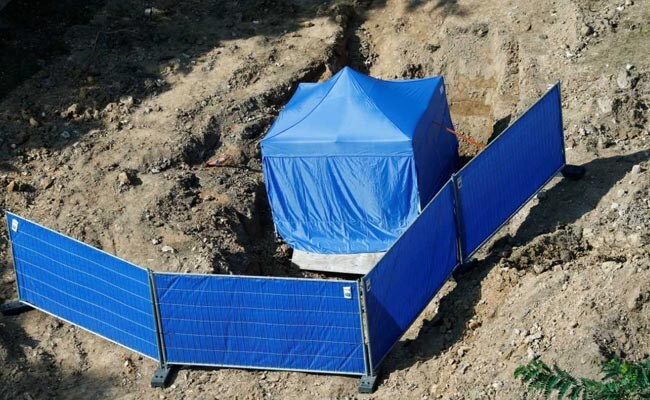
The evacuation area around the bomb covered an area of 1.5 km (Reuters)
Frankfurt, Germany:
Thousands of residents in Frankfurt evacuated their homes early on Sunday ahead of the planned defusing of a massive World War Two bomb discovered on a building site in the German financial capital.
A steady flow of people filed into a temporary centre at Frankfurt's trade fair site, in Germany's biggest evacuation since the war.
The bomb was found last week in the city's leafy Westend suburb, where many wealthy bankers live, and the evacuation area included the country's central bank where $70 billion in gold reserves are stored.
Around 60,000 people had to leave their homes and Frankfurt fire and police chiefs said they would use force if necessary to clear the area, warning that an uncontrolled explosion of the bomb would be big enough to flatten a city block.
Police set up cordons around the evacuation area, which covered a radius of 1.5 km (roughly a mile), as residents dragged suitcases away and many families rode away from the zone by bicycle.
The fire service said the evacuation of two hospitals, including premature babies and patients in intensive care, had been completed and they were now helping about 500 elderly people leave residences and care homes.
More than 2,000 tonnes of live bombs and munitions are found each year in Germany, even under buildings. In July, a kindergarten was evacuated after teachers discovered an unexploded World War Two bomb on a shelf among some toys.
In Frankfurt, bomb disposal experts will use a special system to try and unscrew the fuses attached to the HC 4,000 bomb from a safe distance. If that fails, a water jet will be used to cut the fuses away from the bomb.
The bomb is assumed to have been dropped by Britain's Royal Air Force during the 1939-45 war. British and American warplanes pummeled the country with 1.5 million tonnes of bombs that killed 600,000 people.
Officials estimate 15 percent of the bombs failed to explode, some burrowing six metres (yards) deep.
Three police explosives experts in Goettingen were killed in 2010 while preparing to defuse a 450 kg bomb.
Frankfurt police said they would ring every doorbell and use helicopters with heat-sensing cameras to make sure nobody is left behind before they start diffusing the bomb on Sunday.
Roads and transport systems, including the parts of the underground, will be closed during the work and for at least two hours after the bomb is defused, to allow patients to be transported back to hospitals.
Air traffic from Frankfurt airport could also be affected and small private planes, helicopters and drones were banned from the evacuation zone. Most museums were offering residents free entry on Sunday.
(Except for the headline, this story has not been edited by NDTV staff and is published from a syndicated feed.)
A steady flow of people filed into a temporary centre at Frankfurt's trade fair site, in Germany's biggest evacuation since the war.
The bomb was found last week in the city's leafy Westend suburb, where many wealthy bankers live, and the evacuation area included the country's central bank where $70 billion in gold reserves are stored.
Around 60,000 people had to leave their homes and Frankfurt fire and police chiefs said they would use force if necessary to clear the area, warning that an uncontrolled explosion of the bomb would be big enough to flatten a city block.
Police set up cordons around the evacuation area, which covered a radius of 1.5 km (roughly a mile), as residents dragged suitcases away and many families rode away from the zone by bicycle.
The fire service said the evacuation of two hospitals, including premature babies and patients in intensive care, had been completed and they were now helping about 500 elderly people leave residences and care homes.
More than 2,000 tonnes of live bombs and munitions are found each year in Germany, even under buildings. In July, a kindergarten was evacuated after teachers discovered an unexploded World War Two bomb on a shelf among some toys.
In Frankfurt, bomb disposal experts will use a special system to try and unscrew the fuses attached to the HC 4,000 bomb from a safe distance. If that fails, a water jet will be used to cut the fuses away from the bomb.
The bomb is assumed to have been dropped by Britain's Royal Air Force during the 1939-45 war. British and American warplanes pummeled the country with 1.5 million tonnes of bombs that killed 600,000 people.
Officials estimate 15 percent of the bombs failed to explode, some burrowing six metres (yards) deep.
Three police explosives experts in Goettingen were killed in 2010 while preparing to defuse a 450 kg bomb.
Frankfurt police said they would ring every doorbell and use helicopters with heat-sensing cameras to make sure nobody is left behind before they start diffusing the bomb on Sunday.
Roads and transport systems, including the parts of the underground, will be closed during the work and for at least two hours after the bomb is defused, to allow patients to be transported back to hospitals.
Air traffic from Frankfurt airport could also be affected and small private planes, helicopters and drones were banned from the evacuation zone. Most museums were offering residents free entry on Sunday.
© Thomson Reuters 2017
(Except for the headline, this story has not been edited by NDTV staff and is published from a syndicated feed.)
Track Latest News Live on NDTV.com and get news updates from India and around the world

